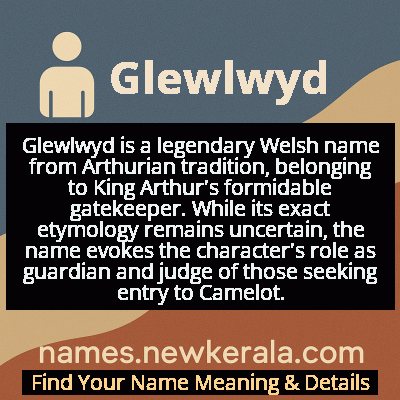Glewlwyd Name Meaning & Details
Origin, Popularity, Numerology Analysis & Name Meaning of Glewlwyd
Discover the origin, meaning, and cultural significance of the name GLEWLWYD. Delve into its historical roots and explore the lasting impact it has had on communities and traditions.
Name
Glewlwyd
Gender
Male
Origin
Arthurian
Lucky Number
3
Meaning of the Name - Glewlwyd
Glewlwyd is a legendary Welsh name from Arthurian tradition, belonging to King Arthur's formidable gatekeeper. While its exact etymology remains uncertain, the name evokes the character's role as guardian and judge of those seeking entry to Camelot.
Glewlwyd - Complete Numerology Analysis
Your Numerology Number
Based on Pythagorean Numerology System
Ruling Planet
Jupiter
Positive Nature
Optimistic, inspirational, and creative.
Negative Traits
Scattered, exaggerating.
Lucky Colours
Yellow, gold, purple.
Lucky Days
Thursday.
Lucky Stones
Yellow sapphire.
Harmony Numbers
1, 2, 9.
Best Suited Professions
Arts, writing, communication.
What People Like About You
Creativity, optimism.
Famous People Named Glewlwyd
Glewlwyd Gafaelfawr
Arthurian Knight and Gatekeeper
Served as chief gatekeeper of King Arthur's court at Caerleon, known for his imposing stature and strict adherence to court protocols
Glewlwyd ap Merwydd
Welsh Warrior
Mentioned in Welsh triads as one of the Three Gatekeepers of the Island of Britain, renowned for his loyalty and martial prowess
Glewlwyd Strong-Grip
Mythological Figure
Featured in Culhwch and Olwen as the formidable gatekeeper who challenges visitors before granting them entry to Arthur's court
Name Variations & International Equivalents
Click on blue names to explore their detailed meanings. Gray names with will be available soon.
Cultural & Historical Significance
His character represents the Celtic tradition of the 'porter' as a wise elder and protector of sacred spaces, bridging the mortal and mythical realms while maintaining the integrity and sanctity of Arthur's court. The role of gatekeeper in Celtic society was one of great honor and responsibility, requiring not only physical strength but also wisdom and discernment. Glewlwyd's continued presence in Arthurian tales underscores the importance of boundaries, both physical and social, in maintaining the order and majesty of the legendary court at Caerleon.
Extended Personality Analysis
Glewlwyd is typically characterized by unwavering loyalty, stern discipline, and a strong sense of duty. As Arthur's gatekeeper, he demonstrates meticulous attention to protocol and an uncompromising commitment to his responsibilities. His personality combines the wisdom of age with formidable physical presence, creating a figure who commands respect through both experience and capability. Despite his stern exterior, Glewlwyd possesses a deep understanding of human nature, able to discern true nobility from mere pretense. He embodies the Celtic ideal of the faithful retainer whose judgment is trusted implicitly by his sovereign.
His interactions with visitors to Camelot reveal a complex character who balances strict adherence to rules with the discernment to recognize exceptional circumstances and worthy individuals. This makes him both a barrier and a gateway to Arthur's legendary court. Glewlwyd's personality reflects the medieval Welsh values of honor, service, and wisdom gained through long experience. He represents the ideal of the seasoned warrior who has transitioned to a role requiring judgment rather than brute force, though his physical prowess remains legendary. His character demonstrates that true strength lies not just in martial ability but in the wisdom to know when and how to exercise authority.
Modern Usage & Popularity
In contemporary times, Glewlwyd remains an extremely rare name, primarily used within academic circles, Arthurian enthusiasts, and Welsh cultural revival movements. The name sees occasional usage in Wales among families seeking to preserve ancient Celtic names, though it has never appeared in modern baby name registries or popularity charts. Its complexity and strong association with Arthurian legend limit its widespread adoption, making it more of a historical and literary curiosity than a practical given name. However, it continues to be referenced in scholarly works about Arthurian literature and Welsh mythology, maintaining its presence as a significant cultural artifact rather than a living naming tradition. The name's obscurity and difficulty of pronunciation for non-Welsh speakers further contribute to its limited modern usage.
Symbolic & Spiritual Meanings
Glewlwyd symbolizes the threshold between worlds, representing both physical and metaphorical gateways. As a gatekeeper, he embodies the concepts of judgment, transition, and protection of sacred spaces. His character signifies the importance of boundaries and the wisdom required to determine who may cross them. The name evokes images of guardianship, loyalty, and the maintenance of order in chaotic times. Symbolically, Glewlwyd represents the elder wisdom that protects tradition while still recognizing true merit and exceptional circumstances. His role as both barrier and facilitator makes him a powerful symbol of discernment - the ability to separate the worthy from the unworthy, the genuine from the false, while maintaining the integrity of the institutions he serves. This symbolic meaning extends beyond Arthurian legend to represent the universal human need for boundaries and the wisdom to manage transitions between different states of being.

